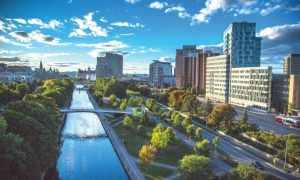As Canada continues to optimize itsimmigrantspolicy, the Provincial Nominee Program (PNP) is seeing important updates and changes in 2025. AsImmigration to CanadaThe Provincial Nominee Program (PNP) allows provinces to nominate foreign nationals as permanent residents based on their economic and labour needs. With the changes in the global labor market, provinces have a greater need forOverseas ImmigrationThe needs of the program are also changing. So, what's new for the Canadian Provincial Nominee Program in 2025? Do you meet the latest eligibility requirements? Today, we'll take you on an in-depth tour of the changes to the Provincial Nominee Program in 2025 and help you determine if you're a good candidate.
I. What is the Canadian Provincial Nominee Program (PNP)?
The Provincial Nominee Program (PNP) is an immigration program run by the Government of Canada in cooperation with the provinces and territories. Each province or territory can select immigrants based on their needs and nominate them to become permanent residents of Canada. Through the PNP, applicants can obtain a faster path to immigration, often with more flexibility than the traditional Express Entry system, and is particularly suited to applicants who have work experience or skill needs in certain provinces.
II. Key Changes to the Provincial Nominee Program (PNP) in 2025
The year 2025 ushers in a number of changes to the Provincial Nominee Programs (PNP) in Canadian provinces, which reflect the differences in immigration needs among the provinces and also make the PNP more relevant to the labour market and economic development. Below are some of the key updates:
1. Increase in the number of places in each province:
With the Canadian government's focus on immigration policy, the number of PNP slots in each province is expected to increase by 2025. This means that each province can nominate more immigrants, especially in those provinces with labor shortages. Provinces such as Ontario, British Columbia, Alberta and Saskatchewan are expected to add more nomination slots, especially for those applicants with skilled work experience.
2. Focus on highly skilled people:
In the 2025 PNP renewal, there is an even more urgent need for skilled workers in the provinces. In particular, highly skilled individuals in the fields of healthcare, information technology, engineering, construction and education will be prioritized. Shortages in these sectors have plagued Canada's provinces, so future PNP programs will make a strong effort to attract experts in these fields.
3. Expansion of Immigration Pathways for International Students in the Province:
For international students who have completed their studies in Canada, the Provincial Nominee Program offers a clearer immigration pathway.In 2025, many provinces will further expand their immigration pathways for international students. In particular, Saskatchewan, Manitoba and Nova Scotia will offer more nomination slots for international students who have completed their studies locally. This makes international students aImmigration to CanadaAn important part of the market.
4. Increase opportunities for temporary workers to convert to permanent residents:
Demand in the Canadian labour market has led to further opening of the pathway for temporary workers to become permanent residents.In 2025, the Provincial Nominee Program will be more flexible to allow workers who have temporary work experience in the local area to apply for immigration. In particular, the pathway for temporary workers to transfer to permanent residence will be greatly simplified in a number of sectors where there is a shortage in the Canadian job market.
5. Increase the requirements for French language proficiency:
The importance placed on French language proficiency in Quebec and other francophone provinces has increased even further.In 2025, applicants who are able to demonstrate a high level of French language proficiency will significantly increase their chances of obtaining a provincial nomination. For those interested in living and working in the Francophonie, improving their French language skills will be an advantage that cannot be ignored.
III. Main categories of the Provincial Nominee Program 2025
The Provincial Nominee Program is not a single program. The Provincial Nominee Program can be divided into several categories based on different needs and qualifications:
1. Skilled Worker Category:
This category is intended for applicants who have specialized skills and work experience. Applicants are required to work in a specific occupation in a Canadian province and are usually required to demonstrate their professional skills by providing a relevant work contract or job offer.
2. International Student Category:
This category is designed for international students studying in Canadian provinces. International students who have completed post-secondary education in Canada can apply for permanent residency through the Provincial Nominee Program. Most provinces offer a Provincial Nominee Pathway that gives preference to applicants who have earned a degree in the province and can provide local work experience.
3. Entrepreneurs andinvestment immigrationEntrepreneur and Investor Category:
Some provinces (e.g., British Columbia, Ontario and Manitoba) offer a Provincial Nominee Pathway for those interested in investing or starting a business in Canada. These immigration programs usually require the applicant to invest a certain amount of money in the province and either start a local business or hire a local Canadian workforce.
4. Provincial Temporary Worker Category (Temporary Worker Category):
This category is primarily for foreign workers who are already working temporarily in a Canadian province. These workers have the opportunity to apply to become permanent residents of Canada through the Provincial Nominee Program if they have technical skills in a specific industry and are able to secure a local work contract or employer support.

5. French-Speaking Worker Category:
For applicants with strong French language skills, especially skilled workers and professionals who are fluent in French, certain Canadian provinces (notably Quebec) will offer more immigration opportunities. Such applicants are usually required to pass a French language test and demonstrate their intention to live and work in a French-speaking community.
IV. How to improve your eligibility for the Provincial Nominee Program?
In order to improve your chances of obtaining permanent resident status in Canada through the Provincial Nominee Program (PNP), the following points are critical:
-
Enhancement of language skills: English or French is key to the Canadian immigration system. Improving your language skills, especially by achieving high scores in the language scoring system, can significantly improve the competitiveness of your application.

-
Get Canadian work experience: If you have the opportunity to work in Canada, especially in shortage occupations, being able to gain local work experience will greatly increase your chances of getting a provincial nomination.
-
Understanding the specific needs of each province: Different provinces have different requirements and criteria. Make sure you understand the PNP requirements for each province and choose the one that best suits your needs to apply.
-
Upgrading academic or professional skills: Canada's PNP program tends to attract highly skilled immigrants, especially in the fields of technology, healthcare, and engineering. Therefore, having a degree or certification of skills in a relevant field will enhance your chances of being nominated.
V. Conclusion
Canada's Provincial Nominee Program (PNP) in 2025 will continue to attract large numbers of skilled workers, international students, entrepreneurs, and temporary workers through the provincial nomination process.Immigration to Canada. Provincial PNP programs have become more flexible and offer diverse opportunities for different categories of applicants. If you meet the requirements and are ready to enter the Canadian market, then 2025 is certainly a great time to apply for a provincial nomination.
Take advantage of these opportunities and be prepared to move towardImmigration to CanadaDream on!






